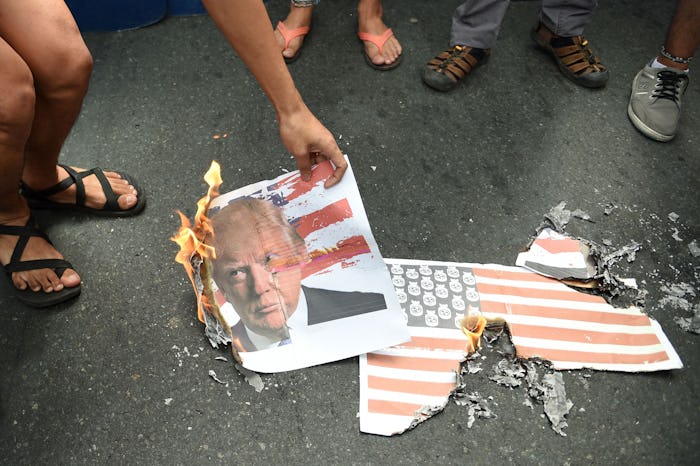News

Court Cases On Flag Burning Show Why It’s An Important, Protected Form Of Expression
On Tuesday, President-elect Donald Trump proposed a penalty for burning the American flag — and he wasn't talking about a light $50 fine, either. "Nobody should be allowed to burn the American flag," he wrote on Twitter Tuesday morning. "If they do, there must be consequences - perhaps loss of citizenship or year in jail!" Burning flags, however, is legal: It's been nearly three decades since the Supreme Court declared that the government couldn't ban the desecration of the American flag, and the two flag burning court cases that led to that Supreme Court decision in 1989 are perfect examples of why flag burning is a protected form of expression — and why it needs to remain a safeguarded part of free speech.
The first flag burning incident that made its way to Supreme Court took place in 1984. Gregory Lee Johnson was one of 18 demonstrators who took part in a flag-burning ceremony outside of the Republican National Convention to protest President Ronald Reagan's policies. He was arrested for violating a Texas statute that barred the desecration of venerated objects, such as the American flag, as long as that desecration was likely to anger others. Johnson appealed the conviction handed down by a Texas court, and the Supreme Court agreed to hear him out.
As it turned out, the majority of the Supreme Court sided with Johnson, and rightly so: the First Amendment protects free speech, even when that speech may anger or offend others. As long as no one is actually being hurt (and that flag is being burned in a safe, controlled environment), the law protects people who are expressing their views, regardless of what those views may be.
That Supreme Court decision only affected the Texas statute that had gotten Johnson in trouble, however, and after seeing the ruling on Texas v. Johnson, the federal government prohibited flag burning nation-wide for any reason other than burning and burying an old flag. When protestors were convicted and sentenced for burning flags in opposition to the new Flag Protection Act, the Supreme Court overturned their convictions. In 1990's United States v. Eichman, the Supreme Court reiterated the protection of flag burning as a legal form of free speech — which was and remains a basic, constitutionally-protected right.
Trump did not give any indication on Tuesday as to what incident made him call for penalizing flag-burning — but, as the Supreme Court pointed out more than 25 years ago, the government is not allowed to decide what counts as "acceptable" free speech, or else it quickly degrades into censorship. Leaders don't have to like what's being said or agree with their citizens, but they do need to unfailingly protect people's right to free speech. As British writer Beatrice Evelyn Hall once wrote: "I disapprove of what you say, but I will defend to the death your right to say it."
One of the pillars that upholds the United States' democracy is citizens' right to free speech. Threatening to punish demonstrations of free speech with revocation of citizenship or jail time flies in the face of established and important constitutional rights — and it's an incredibly dangerous idea for a president-elect to suggest.